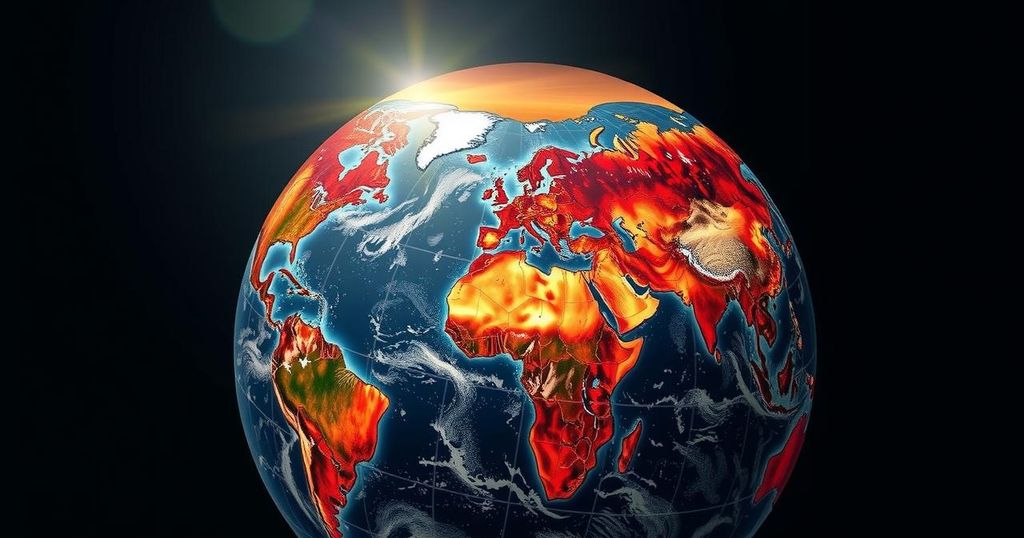Climate change
ASIA, CANADA, CLIMATE, CLIMATE CHANGE, DUBAI, EARTH LEAGUE, ENVIRONMENTAL POLICY, EUROPE, FRANCE, FUTURE EARTH, GLOBAL WARMING, GREENHOUSE GAS EMISSIONS, IMPAK, NORTH AMERICA, PARIS, PARIS AGREEMENT, THE EARTH LEAGUE, UNITED ARAB EMIRATES, WORLD CLIMATE RESEARCH PROGRAMME
Jamal Walker
0 Comments
Global Warming Report Highlights Immediate Climate Crisis and Need for Action
The “10 New Insights in Climate Science” report sheds light on the alarming rise in global temperatures and the urgent need for drastic emission reductions to meet international climate goals as outlined by the Paris Agreement. The report emphasizes the significant impacts of climate change, including increased frequency of extreme weather events and the necessity for equitable policies to gain community acceptance. Researchers advocate for comprehensive climate finance directed at enhancing infrastructure resilience and preparing for future hazards, all while pinpointing the critical role of collaborative efforts leading into COP29.
The article discusses the critical insights presented in the report “10 New Insights in Climate Science,” released by Future Earth, The Earth League, and the World Climate Research Programme. This yearly report compiles contributions from around 80 researchers from 45 countries and highlights the urgent challenges posed by climate change. In 2023, the global temperature reached an unprecedented rise of 1.45 degrees Celsius above pre-industrial levels, and global sea temperatures hit record highs for over a year. These developments underscore the alarming reality that the world is failing to meet the vital targets established by the Paris Agreement. The Global Stocktake (GST) reveals that to maintain global warming below 2 degrees Celsius, emissions need to be cut by at least 28% compared to current projections for 2030. Among the insights, the report identifies a marked increase in atmospheric methane, which significantly contributes to climate warming, alongside a decline in atmospheric aerosols that traditionally provided a cooling effect. The implications of this decline include a possible acceleration in global warming. Furthermore, the report emphasizes the necessity for more research into how various pollutants interact in the atmosphere, urging the need for robust climate finance focused on enhancing adaptability and resilience in critical infrastructures, thus preparing for future climate-related challenges. The authors advocate for equitable climate policies that ensure acceptance at the community level, ensuring that interventions are perceived as fair to facilitate broader engagement and commitment to substantial emission reductions. The aim is to better inform climate policy discussions leading up to COP29 in Baku, Azerbaijan, with hopes of establishing concrete financial commitments to enhance climate resilience and implement actionable targets for emission reduction. The insights point to the increasing severity of climate change impacts, thus emphasizing the importance of decisive action to safeguard both human and environmental welfare.
The backdrop of this comprehensive report highlights the dire state of global climate conditions, accentuated by regular evaluations conducted by credible scientific bodies. The growing body of evidence points to systemic failures in achieving international climate targets, specifically those outlined in the Paris Agreement. The report aligns with the Global Stocktake assessments, providing a detailed exploration of current temperatures and weather anomalies linked to climate change, which has profound implications for global ecosystems, human health, and economic stability. This landscape forms the foundation for understanding the urgency and necessity for innovative policies and advanced research to combat these escalating challenges effectively.
In conclusion, the “10 New Insights in Climate Science” report marks a crucial intervention in the ongoing discourse regarding climate change. It serves as both a wake-up call and a guide for immediate action, outlining the critical need for emission reductions, equitable climate policies, and effective management of resources in the transition toward sustainable energy solutions. The insights collectively illustrate the severity of climate change and the imperative for collaborative efforts across nations to mitigate its effects, particularly emphasizing the responsibility of policymakers to lay the groundwork for substantive climate action ahead of COP29 and beyond.
Original Source: impakter.com




Post Comment